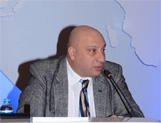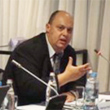Perspectives of EAEU – EU Relations [Over]  By Benyamin Poghosyan, PhD, Executive Director, Political Science Association of Armenia By Benyamin Poghosyan, PhD, Executive Director, Political Science Association of Armenia
The relations (or the lack thereof) between the Eurasian Economic Union (EAEU) and European Union (EU) are one of the key topics of debate between international relations pundits. There are different assessments regarding the current situation and the way forward. However, almost all experts agree that the key issue here resides in the relationship between Russia and the West (US/EU/NATO). As long as this relationship is at its lowest point since the end of the Cold War, there is almost no chance of any substantial cooperation between these two organizations. READ MORE
Armenia–China: Strategic Partnership for Mutual Benefits[Over]  By Benyamin Poghosyan, PhD, Executive Director, Political Science Association of Armenia By Benyamin Poghosyan, PhD, Executive Director, Political Science Association of Armenia
Armenia and China are both among the ancient civilizations of human history. They share millennia of mutual contacts via the ancient Silk Road. However, history is not the only thing which unites the two nations. Both Armenians and Chinese put enormous emphasis on protecting their national identities and traditions. Of course, this does not mean that Armenia and China are not interested or involved in the current wave of globalization. READ MORE
Russia – Turkey relations. Implications for the South Caucasus[Over]  By Benyamin Poghosyan, PhD, Executive Director, Political Science Association of Armenia By Benyamin Poghosyan, PhD, Executive Director, Political Science Association of Armenia
In recent years, Russia – Turkey relations have gone through tremendous transformations. In November 2015, they entered the phase of acute crisis with no hope of quick improvements. However, in summer 2016 the process of reconciliation was launched, which resulted in bringing an unprecedented level of cooperation in economy and in the military-technical sphere. What are the main factors for such change and what does the current Russia – Turkey partnership mean for the South Caucasus. READ MORE
Deciphering Armenia – Russia relations after the “Velvet Revolution”[Over]  By Benyamin Poghosyan, PhD, Executive Director, Political Science Association of Armenia By Benyamin Poghosyan, PhD, Executive Director, Political Science Association of Armenia
A pivot towards the West is simply not in Armenia’s best interest.
Immediately after the “Velvet Revolution” in Armenia during the spring of 2018, the main narrative regarding possible developments in Armenian and Russian relations focused on negative expectations. Conventional wisdom brought plenty of reasons for such a mood. Russian authorities do not like leaders who come to power through street demonstrations, and Russia mainly exerts power in its neighbourhood through a network of corrupt and oligarchic elites. READ MORE
The Number of People in Extreme Poverty Reaches Historical Minimum [Over]  By Nika Chitadze, PhD, Director, Center for International Studies, International Black Sea University, Tbilisi By Nika Chitadze, PhD, Director, Center for International Studies, International Black Sea University, Tbilisi
As good news is less scandalous, it is rarely spread. However, it is necessary to point out that the percentage of people, who live in poverty, reached a historic minimum in 2018. Unfortunately, there was no appropriate reaction of the international community regarding this development.
Over the last 30 years, the number of people who live in poverty has decreased by 1 billion.
READ MORE
How Will Uzbekistan Become A Regional Transit Hub?[Over]  By Fuad Shahbazov, Baku-based independent regional security and defence analyst By Fuad Shahbazov, Baku-based independent regional security and defence analyst
On 5th April of 2019, a meeting of the railway authorities of Kazakhstan, China, Iran, Turkmenistan, and Uzbekistan took place in Almaty dedicated to advancing cargo traffic along the North-South Transit Corridor. In fact, the participation of Uzbekistan in the project will shorten the route of goods from China to Iran and forward. Being a part of the ambitious North-South Transit Corridor, the China-Kazakhstan-Turkmenistan-Uzbekistan-Iran railway can shape the geopolitics of Central Asia. READ MORE
Re-evaluating the idea of ‘Putinism’[Over]  By Eduard Abrahamyan, Wider Black Sea & Central Asia regional security analyst
By Eduard Abrahamyan, Wider Black Sea & Central Asia regional security analyst
While the standoff between adversaries rages on, recent weeks saw an intensified communication between American and Russian high-level officials over the wide array of issues on which Moscow and Washington have contrasting views. On May 14, U.S. Secretary of State Mike Pompeo met with his Russian counterpart, Foreign Minister Sergey Lavrov, and later with President Vladimir Putin in the Russian Black Sea city of Sochi. READ MORE
Ecological Problems of the Modern World and their Impact on International Politics[Over]  By Nika Chitadze, PhD, Director, Center for International Studies, International Black Sea University, Tbilisi By Nika Chitadze, PhD, Director, Center for International Studies, International Black Sea University, Tbilisi
Environmental resources such as water and air have always been necessary for human life and human activities. For the majority of human history, the environment did, however, not represent a problem for mankind and its sustainable development. The environment and the natural resources satisfied the needs of the people, without causing damage to the next generations. In the second half of the 20th century, the topic of environmental protection has entered the political agenda, because humanity’s economic activities have raised environmental pollution to a level that threatens various species and even the ecosystem as a whole.
READ MORE
Eurasia After the Rise of China: The Role of Armenia[Over]  By Armine Arzumanyan, Student, Renmin University, PR of China By Armine Arzumanyan, Student, Renmin University, PR of China
Aiming to create a future where all roads lead to Beijing, China now plans to obtain a global role in politics by putting itself at the centre of global economic affairs through the Belt and Road Initiative (BRI), which is the most ambitious geo-economic vision in recent history. The BRI and its goals, that have been given many different evaluations, has suggested cooperation in Central Asia, West Asia and Eastern Europe. To maintain a balanced security environment at the conjunction of Europe and Asia and to ensure a successful realization of the BRI, China will need a reliable strategic partner in the South Caucasus. This essay points out why Armenia is most likely to be the strategic ally China will need, drawing out the main perspectives and paradigms for more advanced Sino-Armenian relations. READ MORE
New Caspian–Black Sea Transit Corridor Boosts Geostrategic Importance of South Caucasus[Over]  By Fuad Shahbazov, Baku-based independent regional security and defence analyst By Fuad Shahbazov, Baku-based independent regional security and defence analyst
On March 4, Romania, Azerbaijan, Georgia and Turkmenistan held a ministerial meeting in Bucharest—the first such quadripartite gathering for these governments. During this meeting of their foreign ministers, the parties issued a joint statement reaffirming mutual respect for each other’s sovereignty, territorial integrity and inviolability of their internationally recognized borders. Additionally, a number of other important issues were raised in Bucharest, including a discussion on establishing a multimodal corridor for the transport of goods between the Black Sea and Caspian Sea basins, a project officially named the Caspian Sea–Black Sea International Transport Corridor (ITC-CSBS). READ MORE
THAAD in Romania: Bucharest on the Moving Sands of Great Powers’ Competition[Over]  By George Vlad Niculescu, Head of Research, the European Geopolitical Forum By George Vlad Niculescu, Head of Research, the European Geopolitical Forum
On 11 April 2019, NATO confirmed US plans to deploy of the Terminal High Altitude Area Defense (THAAD) system to Romania. According to NATO officials, the United States will fulfil its commitment to NATO’s Ballistic Missile Defence by the temporary deployment of a THAAD system to Deveselu in Romania. The scheduled work is part of the United States European Phased Adaptive Approach to ballistic missile defence, which has been implemented since September 2009. In response, Russian Deputy Minister of Foreign Affairs Alexander Grushko said: “Russia is “closely following” the temporary deployment of a THAAD system to the Deveselu base in Romania.” READ MORE.
Historic and New Silk Road Perspectives of the European Integration of Georgia[Over]  By Nika Chitadze, PhD, Director, Center for International Studies, International Black Sea University, Tbilisi By Nika Chitadze, PhD, Director, Center for International Studies, International Black Sea University, Tbilisi
Georgia is a small country on the crossroads of Europe and Asia. At the same time, together with the economic benefits for the country, which had and has its important geopolitical place between different civilizations, there were frequent confrontations for the gaining control over Georgia and Caucasus Region due to the fact, that modern territory of Georgia was located on one of the branch of the Great Silk Road. Historic Silk Road was functioning since 8-7-th Centuries B.C. till the middle of 15-th Century.
After the collapse of Constantinople in 1453, the interregional Silk Road lost its function, and Georgia was in a very difficult situation, that spanned centuries.
READ MORE
America's Offshore Balancing in Action[Over]  By Benyamin Poghosyan, PhD, Executive Director, Political Science Association of Armenia By Benyamin Poghosyan, PhD, Executive Director, Political Science Association of Armenia
US President Donald J. Trump recent decision to withdraw American forces from Syria caught everyone by surprise: the Washington establishment, foreign policy pundits and everyone else who follow the Middle East Geopolitics. Given the top priority which President Trump has attached to the containment of Iran and curbing its activities in the Middle East, many believed that US presence in Syria should have been either expanded or at least stayed the same. READ MORE
Could Vladimir Putin’s Visit to Azerbaijan Shift the Regional Balance of Power?[Over]
 By Fuad Shahbazov, Baku-based independent regional security and defence analyst By Fuad Shahbazov, Baku-based independent regional security and defence analyst
Russian President Vladimir Putin paid a surprise official visit to Azerbaijan, on September 27. The formal reason for his arrival was to hold talks with Azerbaijani President Ilham Aliyev as well as to jointly attend the Ninth Interregional Russia-Azerbaijan Forum. Local mass media in both Azerbaijan and Russia described Putin’s visit as a next significant step in improving the strategic partnership between the two countries. READ MORE
- December 11, 2018 06:35AM
Turkey's Post Elections Policy in the South Caucasus[Over]  By Benyamin Poghosyan, PhD, Executive Director, Political Science Association of Armenia By Benyamin Poghosyan, PhD, Executive Director, Political Science Association of Armenia
Turkey's strategic alliance with Azerbaijan, trilateral co-operation including Georgia and its efforts to transform itself into a regional energy hub will continue to be the main features of the Erdogan government policy in the South Caucasus.
24 June 2018 was a big day for Turkish domestic politics. Turkey elected both the President and the Parliament. Given the sweeping constitutional changes approved in the April 2017 referendum, the new President has become an almighty figure in Turkey. Despite various assessments envisaging hard times for the incumbent Turkish President, Erdogan managed to win the race without entering into a possibly dangerous run-off. READ MORE
Is America Changing the European Power Play?[Over]  By George Vlad Niculescu, Head of Research, the European Geopolitical Forum
By George Vlad Niculescu, Head of Research, the European Geopolitical Forum
When at the NATO summit in Brussels, on 25 May 2017, president Donald Trump didn’t say that one sentence committing America to continue standing by article 5 of the NATO Charter, he raised eyebrows across Europe. At that time, everyone remembered that candidate Donald Trump raised serious suspicions that his presidency might lead to the end of the West, as we knew it. Nevertheless, everyone who has ever believed in the strength of the Trans-Atlantic link and in the soft power of the Euro-Atlantic values secretly hoped that the end of Pax Americana in Europe wasn’t that close. READ MORE
Armenia and Russia: Bottlenecks on the Way to the Future[Over]  By Nana Gegelashvili, EGF Affiliated Expert
By Nana Gegelashvili, EGF Affiliated Expert
On April 23, Armenian Prime Minister Serzh Sargsyan resigned in response to mass protests. On March 2, 2018, the presidential elections took place in Armenia. According to the amendments to the Armenian Constitution adopted at the December 6, 2015 referendum, initiated by the ruling Republican Party, the president becomes a symbolic figure, while the real power goes to the prime minister. However, despite Serzh Sargsyan’s assurances that he was not going to occupy the chair of the prime minister, the majority of voters in Armenia were confident that it was the incumbent president who would become the next prime minister, which would allow him thus to retain all the power in his hands. READ MORE
The Limits of Changing Armenian Foreign Policy after the “Velvet Revolution”[Over]  By Benyamin Poghosyan, PhD, Executive Director, Political Science Association of Armenia By Benyamin Poghosyan, PhD, Executive Director, Political Science Association of Armenia
The April – May 2018 “Velvet Revolution” in Armenia caught many by surprise. A few, if any, domestic or foreign experts anticipated such a quick removal from power of the long-term leader Serzh Sargsyan and the Republican Party. Many questions regarding the factors which facilitated the revolution remained unanswered. However, protest leader Nikol Pashinyan has been elected Prime Minister on May 8, and he will hold that position at least until the snap Parliamentary elections, either in November 2018 or in spring 2019. READ MORE
Armenia’s “Velvet Revolution” and the Karabakh Conflict Resolution[Over]  By George Vlad Niculescu, Head of Research, the European Geopolitical Forum
By George Vlad Niculescu, Head of Research, the European Geopolitical Forum
On 17 April 2018, Armenia’s National Assembly overwhelmingly voted to install Serzh Sargsyan -former president of the country- as prime minister. They unequivocally ignored the “voice of the street” calling for a change of face at the helm of this rather small, but ambitious post-Soviet state. This vote was supposed to conclude a power capture scheme started back in 2015.[…] Under pressure from independent civil society, then president Sargsyan had promised not to turn up as candidate for the prime-ministerial post. READ MORE
Deciphering Russia’s Messages in the Post-Soviet Space[Over]  By Benyamin Poghosyan, PhD, Executive Director, Political Science Association of Armenia By Benyamin Poghosyan, PhD, Executive Director, Political Science Association of Armenia
Since the Russia – Georgia war in 2008 one of the key geopolitical features of the post–Soviet space has been the Russian effort to reinstall its influence over former Soviet republics and diminish the role of the Euro-Atlantic community. The 2008 war, the 2014 Crimea crisis, and the ongoing conflict in Eastern Ukraine are examples of Russian use of hard power to pursue geopolitical interests in the region. However, one of the key tools in the Russian arsenal to regain its dominant position within the post–Soviet world is the effective use of propaganda and information campaigns against the Euro-Atlantic institutions. READ MORE
Turkey and Russia aspire to replace a century of Western domination of the Middle East[Over]  By Benyamin Poghosyan, PhD, Executive Director, Political Science Association of Armenia By Benyamin Poghosyan, PhD, Executive Director, Political Science Association of Armenia
An "Eurasianist" ideology is helping to consolidate a Russia - Turkey strategic alliance, as a viable tool to achieve long term strategic interests in the Middle East and beyond.
The security architecture of the Middle East is in the midst of a tremendous transformation. Since the end of the First World War the region has been under Western domination of some form or another. In 1920s and 1930s it was wrapped within the mandate system imposed by the League of Nations, and since the end of the Second World War the US has been the regional kingmaker. The Soviet Union had some footholds such as Egypt during Nasser's rule, as well as Syria and parts of Yemen. READ MORE
The Current State and the Prospects of Armenia - Turkey Relations[Over]  By Benyamin Poghosyan, PhD, Executive Director, Political Science Association of Armenia By Benyamin Poghosyan, PhD, Executive Director, Political Science Association of Armenia
Since gaining independence in 1991 Armenia has faced tough challenges in building relations with two of its four neighbors – Azerbaijan and Turkey. Relations with Azerbaijan were mainly influenced by Karabakh conflict. Armenia was supporting Nagorno Karabakh Armenians to defend themselves against Azerbaijani aggression. The end of hostilities in 1994 and the signature of a ceasefire agreement did not bring up peace, and negotiations are still underway, for the last 23 years, to find a mutually accepted settlement. READ MORE
Everyone is happy with the new Armenia-Russia-EU threesome[Over]  By Benyamin Poghosyan, PhD, Executive Director, Political Science Association of Armenia By Benyamin Poghosyan, PhD, Executive Director, Political Science Association of Armenia
Armenia, the European Union and Russia had more to gain than lose from the signing of the new Armenia - EU enhanced co-operation agreement. Paradoxically Armenia's membership of the EAEU was transformed from a liability into an asset during Yerevan's second attempt at negotiations with the EU.
On November 24, 2017 Armenia and EU signed a Comprehensive and Enhanced Partnership Agreement (CEPA) during the Eastern Partnership Brussels summit. The negotiations were launched in December 2015, and the agreement was initialled in March 2017. This was the second attempt to sign a new agreement between Armenia and EU. In 2010 – 2013, negotiations were held to elaborate an Association Agreement (AA), including the establishment of the Deep and Comprehensive Free Trade Area. READ MORE
- December 18, 2017 21:58PM
Tensions test the resilience of the US-Turkey alliance[Over]  By Benyamin Poghosyan, PhD, Executive Director, Political Science Association of Armenia By Benyamin Poghosyan, PhD, Executive Director, Political Science Association of Armenia
A raft of issues are complicating relations between long-time allies Turkey and the United States. But both sides continue using diplomatic back-channels to get as many concessions as possible from each other without fatally harming bilateral relations.
US - Turkey relations are probably at their lowest point since the start of the Cold War in late 1940s. Turkey, as a NATO member, played a key role in fortifying the alliance's southern flank against the Soviet threat. The collapse of the Soviet Union created new geo-strategic conditions, and both the US and Turkey were in quest of new rationales for fostering their relationship. In the 1990s, Turkey was perceived in the US as a potential model on how to develop democratic institutions in newly independent republics with Muslim majority populations from the Caucasus and Central Asia. READ MORE
|
|